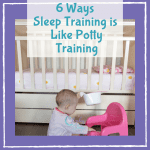
You just can’t take it anymore. The exhaustion, the bleary eyes, the waking-up-more-times-each-night-than-you-thought-humanly-possible… “Enough is enough!” you’ve said to yourself. It’s time to take action. It’s time to reclaim your nights. It is time to start sleep training!
This, readers, is the point at which many parents first visit The Baby Sleep Site. They’re beyond exhausted. They know their babies are waking more frequently than is necessary, but they just don’t know how to make the night-waking stop. However, they also know that if something doesn’t change soon, “death by sleep deprivation” is going to become a real possibility!
Our solutions for these parents? Sleep training. We’ve written a ton on this subject, from free guides, to blog articles, to one-on-one sleep support packages. We’re not going to go into the ins-and-outs of how to sleep train in this article.
Instead, we’re going to focus on 5 things parents should do BEFORE they start sleep training. We believe strongly that having a plan can take you far on the road to success. With that in mind, let’s talk over 5 things to do before you start sleep training.
Sleep Training: 5 Things To Do BEFORE You Start
-
Catch up on sleep. (This means everyone!)
You’ve heard the expression “things will get worse before they get better”, right? Well, that applies to sleep training in a big, big way. When you start sleep training, expect for everyone to lose some sleep before things start to improve. Remember, your baby is learning a new skill here — sleep probably won’t come easily right from the beginning! For this reason, it’s critical that mom, dad, and baby be well-rested before starting this process.
-
Develop bedtime and naptime routines.
Consistency is one of the most important parts of any sleep training plan — the faster your baby learns that the same things will keep happening at the same times, the faster he’ll learn how to break his sleep associations and start sleeping through the night. And routines go a long way towards building consistency.
Start developing small, simple patterns before naps and bed — this could include reading a few books, rocking and singing a song, having a bath, etc. Start on these bedtime routines and naptime routines before you begin sleep training; that way, your baby will already be familiar with them before you actually start the sleep training process.
-
Make a trip to the doctor.
The idea here is that you want to rule out any underlying medical issues common to babies that might be causing your baby’s sleeplessness. Sleeplessness can be caused by simple things, like illness or teething; however, it can also be caused by more serious medical conditions, like food allergies, reflux or sleep apnea. If you have any concern that your baby’s lack of sleep might be related to a medical issue, see your doctor. Once you’ve ruled out a medical issue, you can continue with sleep training.
-
Make a plan.
We like planning, remember? 🙂 Just as you may have made a birth plan or a plan to start your baby on solids, you’re definitely going to want to make a plan for how you’re going to actually sleep train. There are a variety of sleep training methods you can try; determine which one seems best for your family and your situation, and then set about implementing it at home. But, take a step further than that and outline exactly what you plan to do every step of the way. We find families are more apt to follow through and be successful.
We usually recommend that parents try a sleep training method for at least a week before deciding whether it’s successful or not (again — consistency!) However, if you put in a solid 7 days trying one method, and it’s proving to be disastrous, don’t be afraid to try something else. Your plan isn’t carved in stone, after all. Do what works best for your baby and your family.
-
Clear your calendar.
When you start sleep training, you’ll want things to be as normal as possible around your house for at least a few weeks. Again, consistency is a huge part of the sleep training process. We want to establish predictability and routine. And it’s hard to do that if your days (and nights) at home don’t look the same from one day to the next.
This is why we don’t recommend that people start sleep training right before a move, or before a vacation. Sleep training shouldn’t happen right before the birth of a new baby, or before major surgery. All those things cause disruptions to the normal flow of life in your home, and those disruptions are going to disrupt any sleep training you’re trying to do, too.
Nicole’s Note
“We get asked a lot whether to start now or after an upcoming vacation. My general advice is if you have at least two weeks before a vacation, you can at least start ‘Phase 1’ now, which might mean just a part of your short- and long-term goals. If you have at least 3-4 weeks prior to a vacation, I recommend you go for it! It may even lead to a better vacation and there is never really a ‘perfect’ time for big changes. You can always find an excuse for not taking that first step, which is the hardest.”What’s more, if you’re an “on the go” parent, you may need to cancel some of your plans. You’ll probably need to spend your days and nights at home for a few weeks — no all-day errands, no late-night excursions. You want baby to have plenty of time to practice sleeping in crib or bassinette, and plenty of opportunities to adjust to the new schedule and routine.






